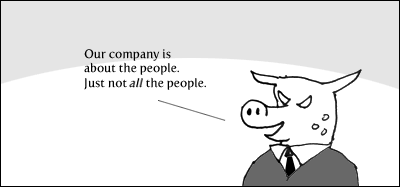 "Long live the web!" "And long live the people who use the web!"
"Long live the web!" "And long live the people who use the web!"I'm sure we all want the web to continue to succeed, inspire and grow, don't we? Most of us now recognise the enormous potential it has to enrich all our art, our
intellectual lives and our culture. We love to
talk about and share those things, at length in blogs, tweets, sites, feeds and just day to day chatter.
But we're noticeably silent when the question turns to one particular matter. It's the dirty word in business - we love to talk about exciting products and projects but there's inevitably shuffling of feet, red faces and mumbling when it's time to talk about how much they'll actually
cost. Nobody likes the M word. We'd rather call it something nice like "revenue", "capital", in fact all in all we'd probably prefer to call it something nice and non-scary like "candy floss".
And that's a problem. It's a problem for most of us, but it's most especially a problem for the web, in fact it's a great big elephant in the room that we're all
not talking about. We're not talking about how
Facebook has
200 million active customers and makes hardly any candy floss. We're not talking about the real struggle to get any candy floss at all out of
Twitter.
This coyness is partly to do with the way the web grew up. At most of the parties we call industries, the
entrepreneurs arrive first with the great ideas, then the financiers turn up with the candy floss, the marketers arrive to sell the tickets and last but not least the geeks build the thing and the party gets started. Part of the difficulty on the web is that at this particular party the geeks turned up first, not last. They were there for a long time making small talk about computers before some
entrepreneurs arrived and started phoning the
financiers to drag them out of the wine bars and along to the party. It was much, much later that the marketers got to the party and found that it was very much in full swing with candy floss everywhere - and nobody had thought to sell any tickets.
What the web needs, what Twitter and
Facebook needs, is marketers. Not the old-fashioned
Sherriff of Nottingham type who sees something people like and simply slaps a tax on it and asks for your credit card number - a new breed of marketer who can see ways to make these incredible online communities produce candy floss and lots of it, without shouting
stand and deliver every someone touches a keyboard. This is a once in an eternity opportunity for marketers to change society and commerce as we know it by finding creative ways to produce money (there, I said it) without charging at the point of receipt. Marketers are the experts in finding ways to generate revenue from ideas, the experts in making industries sustainable and stable by
incorporating them into the fabric of our economy. We need you, marketers. We need you for a task as far removed from washing machine insurance and cheap deals as going to the moon is from selling bus tickets. A task that really, truly matters to every single one of us, and a task which could change the public's view of marketing forever. Can we count on you?
 If Shakespeare was alive, would he use Twitter? What about Da Vinci? Or Mozart? Would they blog? Or use Facebook?
If Shakespeare was alive, would he use Twitter? What about Da Vinci? Or Mozart? Would they blog? Or use Facebook?
